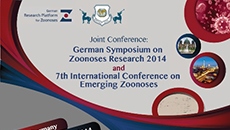Zoonoses: Global collaboration is more important than ever

Joint German/International Conference on Zoonoses 2014
The current outbreaks of Ebola and MERS coronavirus vividly underline the significance of interdisciplinary collaboration in infection research; in particular they highlight the im-portance of exchange between physicians and veterinarians.
Against this background, the German Symposium on Zoonoses Research, this year hosted as an international conference, could not have come at a better time. The event, to be held in Berlin on 16 and 17 October 2014, will spotlight both emerging and existing diseases.
Ahead of the event, Ebola expert Professor Heinz Feldman (National Institutes of Health, Bethesda, USA), who played a leading role in its planning, stressed: “I hope the conference can also reach the attention of funding agencies and policy makers to secure funding for zoonotic diseases in future years.”
As part of the Symposium, the German Academy for Animal Health will present a research prize to Dr. Fabian Leendertz (Robert Koch Institute, Berlin, Germany). Leendertz, a veterinarian specialising in microbiology, has made a significant contribution in epidemiological contexts – particularly in the field of emerging zoonoses.
His projects this year included heading a large team of researchers investigating the origin of the Ebola virus in Guinea, the source of the disease’s current outbreak in West Africa. The award-winning researcher will give a keynote presentation about his work at a prize ceremony on 16 October at 4 pm.
The Joint Conference: German Symposium on Zoonoses Research 2014 and 7th International Conference on Emerging Zoonoses will bring together more than 350 researchers from all over the world.
These experts deal with infectious diseases that can be transmitted between humans and animals, both in a scientific context and in practical applications. Interest in the event was so high that even the reserve list for places has now been closed.
Overview of keynotes
16.10.2014
– 10:30 am – Sylvatic Dengue – The Forgotten Re-Emerging Zoonosis | Dr. Nikos Va-silakis, USA
– 11:15 am – MERS CoV – Studies at the Human An-imal Interface | Prof. Marion Koopmans, The Netherlands
– 4:00 pm – Current Ebola Virus Outbreak in West Africa | Dr. Fabian Leendertz, Germany
17.10.2014
– 2:30 pm – Challenges for Zoonoses Research in Germany and Worldwide | Prof. Dr. Jörg Hacker, Germany
– 3:15 pm – New Host Specific Infection Biology Aspects of Yersinia enterocolitica | Dr. Petra Dersch, Germany
The conference at a glance:
• Date: 16 October 2014, 10 am, 17 October 2014, 5 pm
• Language: English
• Venue: Hotel Steglitz International, http://www.steglitz.bestwestern.de
Schlossstrasse/Albrechtstrasse 2, 12165 Berlin, Germany
• Conference website: http://www.zoonoses2014.com
• Accreditation for media representatives: via email to presse@zoonosen.net
Contact
For scientific questions
Dr Ilia Semmler | German Research Platform for Zoonoses
Tel.: +49 30 2200 24 772 | presse@zoonosen.net | http://www.zoonosen.net
For public relations
Antje Schuett
Tel.: +49 30 2200 24 731 | Mobile: +49 173 6141663 | presse@tmf-ev.de
Background
German Research Platform for Zoonoses: Zoonotic research is performed in Germany at universities and government institutions, in both small work groups and large networks. The knowledge and experience of physicians, veterinarians, infection biologists and scientists from other disciplines play a key role. Funded by the German Federal Ministry for Education and Research, the German Research Platform for Zoonoses provides an infrastructure and scientific support, fostering collaboration between all stakeholders. Its task is to enable closer links between biomedical fundamental research and human and animal medicine to pave the way for more efficient research into zoonoses in Germany. The Zoonoses Platform is jointly operated by the University of Münster, the Friedrich-Loeffler Institut (Riems site) and TMF. Further information: http://www.zoonosen.net
International Conference on Emerging Zoonoses: The 2014 Conference in Berlin follows six successful conferences, each of which provided an interdisciplinary forum for physicians, veterinarians, epidemiologists, immunologists, virologists, microbiologists, public health experts and others concerned with the ever-increasing threats associated with the transmission of infectious diseases from animals to humans. Further information: http://www.zoonoses-conferences.com
http://www.zoonoses2014.com – Conference website
http://www.zoonosen.net/Default.aspx?tabid=1275 – German Research Platform for Zoonoses
Media Contact
All latest news from the category: Event News
Newest articles

Parallel Paths: Understanding Malaria Resistance in Chimpanzees and Humans
The closest relatives of humans adapt genetically to habitats and infections Survival of the Fittest: Genetic Adaptations Uncovered in Chimpanzees Görlitz, 10.01.2025. Chimpanzees have genetic adaptations that help them survive…

You are What You Eat—Stanford Study Links Fiber to Anti-Cancer Gene Modulation
The Fiber Gap: A Growing Concern in American Diets Fiber is well known to be an important part of a healthy diet, yet less than 10% of Americans eat the minimum recommended…

Trust Your Gut—RNA-Protein Discovery for Better Immunity
HIRI researchers uncover control mechanisms of polysaccharide utilization in Bacteroides thetaiotaomicron. Researchers at the Helmholtz Institute for RNA-based Infection Research (HIRI) and the Julius-Maximilians-Universität (JMU) in Würzburg have identified a…



